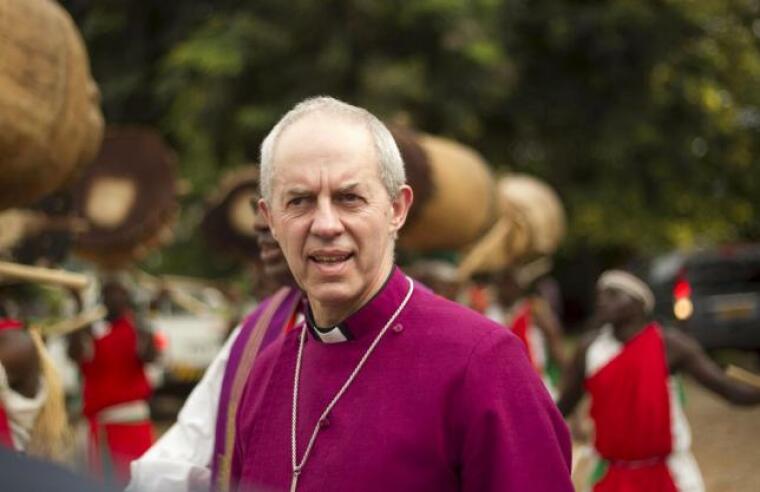Archbishop of Canterbury makes historic first with Church of Scotland's Columbia Declaration

Archbishop of Canterbury Justin Welby has become the first head of the Church of England to participate in a debate at the Church of Scotland's General Assembly on Wednesday, May 25 that approved the proposal for the Columbia Declaration.
"We are united in witness to Christ as churches of our two nations within the one country of the United Kingdom, and that gives particular parameters to our unity in witness," said the archbishop during the assembly.
According to The Courier, the reverend has voted for the proposal on the Columbia Declaration, which paved the way for a "deeper relationship" between the two churches by allowing members and clergy to minister and worship in each other's churches.
Welby also indicated that the two churches are united politically, historically, and economically, citing samples to emphasize his point.
"In itself the Declaration is largely of a symbolic nature but it does pave the way for our further growth in fellowship and for extending partnership in mission as sister and national churches who share many common roots, challenges and opportunities," said Right Rev. Dr. Angus Morrison, as reported by The Church of Scotland.
In February, Dr. Morrison participated in a debate for the same proposal during the General Synod in London that approved the agreement. Former Archbishop of Canterbury Dr. Rowan Williams also spoke at the General Assembly in 2012 but did not participate in a debate.
According to Christian Today, another Scottish church that has existing links with the Church of England, the Scottish Episcopal Church (SEC), is unhappy with the Declaration and has withdrawn from talks concerning the landmark report.
The six-day gathering opened on Saturday, May 21 in Edinburgh and is attended by 850 commissioners not just in Scotland but also in the U.K., Africa, Asia, North America, Europe, the Middle East, and the Caribbean. On its first day, the assembly voted to allow ministers to be in same-sex marriages.
 Christians don't have to affirm transgenderism, but they can’t express that view at work: tribunal
Christians don't have to affirm transgenderism, but they can’t express that view at work: tribunal Archaeology discovery: Medieval Christian prayer beads found on Holy Island
Archaeology discovery: Medieval Christian prayer beads found on Holy Island Presbyterian Church in America votes to leave National Association of Evangelicals
Presbyterian Church in America votes to leave National Association of Evangelicals Over 50 killed in 'vile and satanic' attack at Nigerian church on Pentecost Sunday
Over 50 killed in 'vile and satanic' attack at Nigerian church on Pentecost Sunday Ukrainian Orthodox Church severs ties with Moscow over Patriarch Kirill's support for Putin's war
Ukrainian Orthodox Church severs ties with Moscow over Patriarch Kirill's support for Putin's war Islamic State kills 20 Nigerian Christians as revenge for US airstrike
Islamic State kills 20 Nigerian Christians as revenge for US airstrike Man who served 33 years in prison for murder leads inmates to Christ
Man who served 33 years in prison for murder leads inmates to Christ


 Nigerian student beaten to death, body burned over ‘blasphemous’ WhatsApp message
Nigerian student beaten to death, body burned over ‘blasphemous’ WhatsApp message 'A new low': World reacts after Hong Kong arrests 90-year-old Cardinal Joseph Zen
'A new low': World reacts after Hong Kong arrests 90-year-old Cardinal Joseph Zen Iran sentences Christian man to 10 years in prison for hosting house church worship gathering
Iran sentences Christian man to 10 years in prison for hosting house church worship gathering French Guyana: Pastor shot dead, church set on fire after meeting delegation of Evangelicals
French Guyana: Pastor shot dead, church set on fire after meeting delegation of Evangelicals ‘Talking Jesus’ report finds only 6% of UK adults identify as practicing Christians
‘Talking Jesus’ report finds only 6% of UK adults identify as practicing Christians Mission Eurasia ministry center blown up in Ukraine, hundreds of Bibles destroyed: 'God will provide'
Mission Eurasia ministry center blown up in Ukraine, hundreds of Bibles destroyed: 'God will provide' Church holds service for first time after ISIS desecrated it 8 years ago
Church holds service for first time after ISIS desecrated it 8 years ago Burger King apologizes for 'offensive campaign' using Jesus' words at the Last Supper
Burger King apologizes for 'offensive campaign' using Jesus' words at the Last Supper Uganda: Muslims abduct teacher, burn him inside mosque for praying in Christ’s name
Uganda: Muslims abduct teacher, burn him inside mosque for praying in Christ’s name